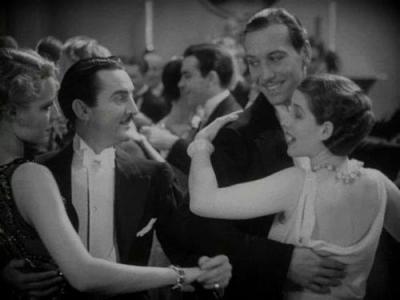- Jazz Age Manners
- Cutting In to the Dance in the Jazz Age
- Dance Etiquette - 1926
- Same-Sex Social Dancing in the Jazz Age
- Shocking Fashion Trends in 1920 or The Adventures of Minnie Fewclothes
- Social Dancing and the Art of Conversation
- Some Thoughts on Men and Clothes at a Jazz Age Event
- The Wearing (or not Wearing) of Gloves in the Jazz Age
- Where People Danced in the Jazz Age
Dance Etiquette - 1926
 From Washington Post/Vogue Column: Conduct and Common Sense. 1926
From Washington Post/Vogue Column: Conduct and Common Sense. 1926
Some practical advice on how to behave in the Jazz Age/Roaring Twenties.
Husbands and Wives
In society, husbands and wives consider a ball or dance, or, indeed, any form of entertainment, the occasion for seeing their old friends and acquaintances and making new ones, not for staying together. At dinners they are separated as far as possible, to give them both a chance to express themselves as individuals, not as halves of a never-to-be-divided whole. At dances, though a couple who happen to like dancing together may, and do often, take a turn, the etiquette of the evening is that they should both have too many partners to be able to see much of each other. If they are seen constantly together, the idea conveyed to onlookers is that they don't know many people and are not having a much gayer time than they would have together at home. This may be far from the case, but the impression is conveyed all the same. Married men and women go out to see people, not to be with each other.
Of course, this supposes that the places they go to are places where they are surrounded by friends and acquaintances. That is what society is--the meeting of amusing people in amusing places. But if a man and his wife found themselves at a dance where they knew few, if any, people, they would most naturally take advantage of a good floor and good music to dance together. This would be sensible and enjoyable, but etiquette would not be involved. A man should dance with his hostess at any ball, once or twice during the evening, but he need not (and often could not), make his first dance the one with her. He might dance first with his wife. If some one else did not ask her at once, but it would not be obligatory.
The Quandaries of Girls at a Dance
How may a girl get rid of an unwelcome partner is an agitating question. In some ways this is a more difficult problem than it was in the days when girls had parents, or relations, or older people who chaperoned them at balls. Then they could return, if they pleased, to those havens of refuge when they had finished a dance. Now, of course, they can cast appealing eyes at some young man and get him to "cut in," or, if that's not successful, they may use their wits to the extent of pretending they have torn their gowns and must go to the dressing room for repairs.
May a girl refuse to dance with a man, is also asked; and, provided she makes a polite excuse and so avoids hurting his feelings, she may. There are many conditions under which she might have to do this, and she should know how to manage a civil escape.
Should young women who do not dance go to dancing parties? Why not? If a girl is pretty and pleasing, she may look well and talk well, and so contribute to the general enjoyment. Perhaps, if she were to keep too many good partners off the floor, she might not be popular among the other girls, but in most parties there are more than enough extra men, and an agreeable "sitter-out" would be an attraction worth having.
Girls who go to college dances should not expect young men to pay for anything but the evening entertainments provided. They should be accompanied by chaperons, they should behave discreetly, look pretty and be appreciative of all the boy's endeavors to amuse them.
Quandaries of Young Men at Dances
How shall a young man who has been introduced to a girl and finds himself what is called "stuck' with her manage to leave her? Of course, his hostess should see to it that some one else takes her off his hands after the dance or talk has lasted long enough. But hostesses do not always see these situations quickly enough, particularly at large dances; so that the man must manage, if the girl does not, to effect a separation. He could always say something like this:"May I find you a seat somewhere for a few minutes? I promised to dance with my cousin" or. "I've got a sister to look after" or "I'm going after a drink of water. shall I get you one?" which would leave him free long enough to find a substitute or give her a chance to get into conversation with another man.
Must the young man ask the girl with whom he is dancing to go to supper with him if the supper march is played before they can separate? If he happens to have no partner and she has none, it would be kind and therefore polite, but he is not obliged to do it. He might find her a partner. He might tell her that he was engaged for supper and must leave her wherever she wanted to be left. He might tell her that if she would just come down with the crowd he would try to find her a place somewhere, or would look after her after He had looked after his partner; anything simple and considerate.
Should a man ask his hostess to dance? Yes, if she's a dancing hostess.
